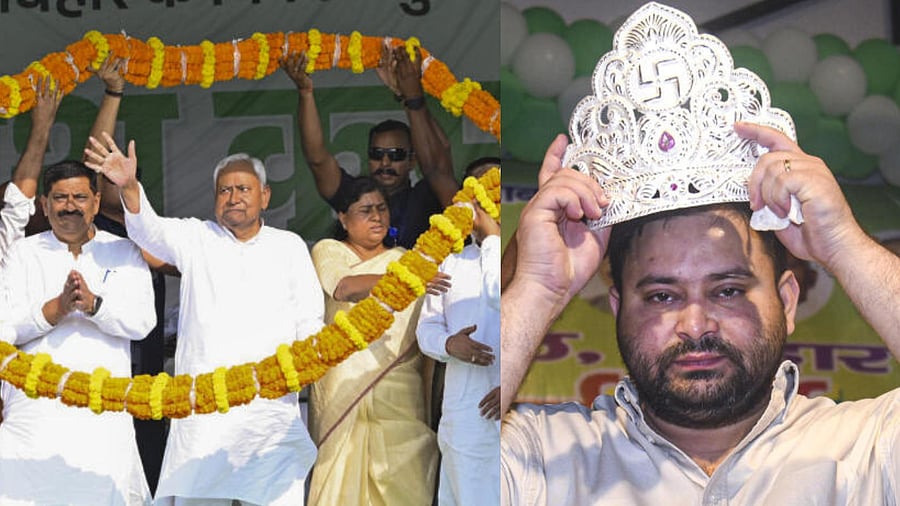
What worked for NDA and what didn't for INDIA bloc.
Credit: PTI photos
Patna: Keep your friends close and your enemies closer, the famous line from Francis Coppola’s 'The Godfather', appears to have been a guiding principle for the NDA in Bihar under Chief Minister Nitish Kumar, which closely tracked the moves of the opposition to outwit them when the time was ripe.
The ruling coalition began rolling out a series of benefits and announcements, seemingly unfazed by opposition taunts that it was being a "copycat".
Shortly after RJD leader Tejashwi Yadav, who would later be named as the chief ministerial candidate of the opposition INDIA bloc, had announced that if voted to power, the coalition will give 200 units of free power, the longest serving CM, once a vocal critic of "freebies", did a volte face of a different kind.
Kumar announced 125 units of free power every month, which meant large sections of a population with very little energy consumption needs, would have to pay next to nothing by way of electricity bills.
The move may have offset the public anger that was building up in the wake of "prepaid meters" which were being blamed for inflated bills and could have become a major issue during elections.
However, this was not all. Another attractive promise of Yadav, who was being called "the most preferred CM candidate" in several opinion polls, was to bring in "100 per cent domicile".
While the legality of such a move would have always been under question, the Nitish Kumar government came out with an ingenious take. It announced 100 per cent domicile "only for women who already enjoyed 35 per cent reservations in all government departments." While the quotas had already endeared the regime to the state's female workforce, the "domicile" policy ensured that the benefit accrued to those whose loyalty mattered at the hustings.
In addition, there have been a number of other measures through which the government was able to tide over the fatigue that was setting in with the same dispensation being in place for two decades.
These included hike in stipends paid to workers in unorganised sector, like Aasha, Aanganwadi jeevika, increase in the pension given to elderly women and other socially vulnerable groups.
Moreover, Yadav's bid to win over women through a 'Mai Bahin Samman Yojana' was stymied through 'Mukhymantri Mahila Rojgar Yojana', under which Rs 10,000 has been transferred into accounts of each of over one crore women.
The young RJD leader was left with no option but to recoil in horror, declaring that he would make "no new announcements till model code of conduct came into force", making it impossible for the government to "copy" any of his promises.
By the time polls were announced, the opposition seemed to have run short of fresh ideas. Yadav was not able to offer anything new except the promise of "government job to at least one member of every family", which, even in the eyes of die-hard RJD supporters, was too good to be true.
Attempts to chip away at the NDA's Extremely Backward Classes support base, through promises like a law against atrocities on the lines of SC/ST Act, were never followed through, perhaps out of fear that it would enrage the upper castes and the powerful OBCs.
Moreover, once the elections were announced and the BJP pulled out its heavy artillery, led by Prime Minister Narendra Modi, the opposition seemed out of depth in refuting the charge that the RJD represented "return of jungle raj".
Posters highlighting the persona of Yadav, the 36 year-old-son and heir apparent of RJD supremo Lalu Prasad, were dismissed as "jungle raj wearing new clothes" and an indiscreet poll campaign, which had young boys singing paeans, on the stage, to the virtues of "katta" and "rangdaari", made viral through social media proliferation, only made matters easier for the NDA spin doctors.
Modi, during his campaign, latched on to the opportunity, urging women to "keep jungle raj at bay", calling them the "worst victims" of the lawlessness that allegedly characterized the period while RJD was in power.
Women voters, who have consistently backed Kumar for imposing prohibition despite its challenges, were also unimpressed by Yadav’s stance on diluting the liquor ban by exempting toddy, though he stopped short of declaring that "sharaab bandi" would be scrapped altogether, like Jan Suraaj Party founder Prashant Kishor who has ended up biting dust.
The near absence of women at the otherwise well attended rallies of Yadav were a clear signal of which way the wind was blowing.